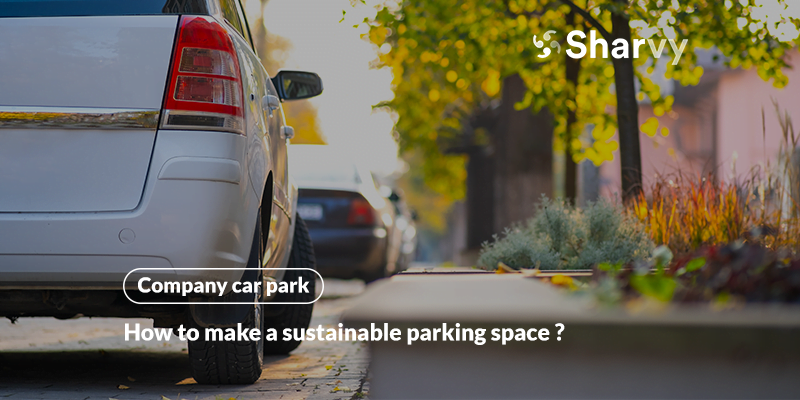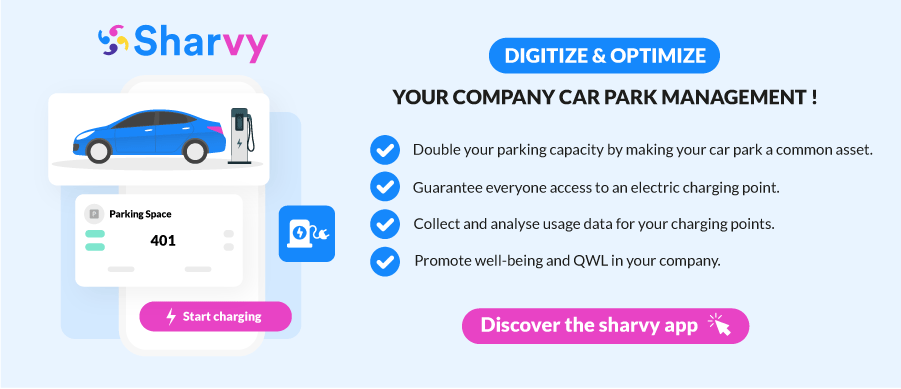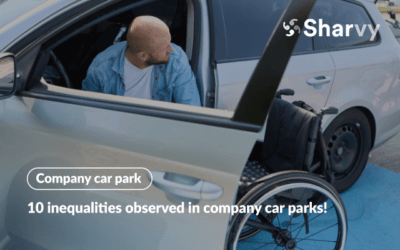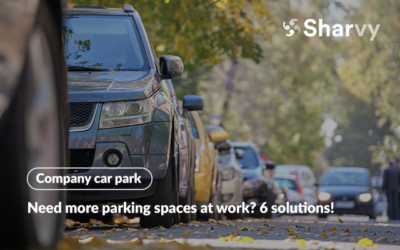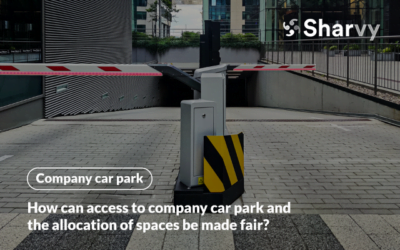There’s no doubt about it : many companies are rethinking their car parks to establish themselves in towns and cities that are airy and green and give pride of place to intermodality and soft transport.
Two main trends are at the forefront of this rethinking : employee comfort and the environment.
As a result, companies are increasingly looking for advice and various solutions for building and fitting out an ecological and sustainable parking space. In many respects, this represents unsuspected advantages for companies and employees alike.
But how do you go about it, and where do you start? What exactly are the benefits? Are there any obligations to be met? What advice should you seek before embarking on this project? All the answers in this article!
What is a “sustainable parking space” ? Principles & objectives.
A “sustainable parking space” is a car park designed to reduce environmental impact. As a result, it incorporates ecological practices and various technologies to minimize the devastating effects of so-called “impermeable” car parks in city centers and on roads.
Let’s remember : the urbanization of our lifestyles is leading to an inevitable increase in soil sealing. In the European Union, between 1990 and 2000, at least 275 hectares of soil were lost daily, equivalent to 1,000 km2 per year. Most of this soil is permanently covered by impermeable layers of buildings, roads, and, in particular, car parks.
As a result, when you think of a company car park, you think of asphalt, bitumen, and other concrete and solid materials. They are ideal for the passage and parking of vehicles of all weights.
But this is an anachronistic concept!
All the more so as the environmental impact is numerous : loss of natural and agricultural resources, fragmentation of natural habitats and biological corridors, intensification of water run-off, increased risk of flooding, etc.
That’s why car parks now need to be more environmentally friendly. This involves the layout and choice of surfacing (no more all-concrete car parks) and the installation of various infrastructures and new parking management practices, the benefits of which often need to be revised.
To promote more sustainable arrangements in urban areas, various municipalities have implemented regulatory prescriptions encouraging the creation of eco-friendly parking lots. These regulations promote integrated rainwater management and pollutant reduction, contributing to better water quality in urban environments. Initiatives can include incentives for the use of permeable pavements, the installation of sustainable water management systems, and the integration of vegetation to improve sanitation and reduce erosion. Companies should consult local urban planning documents to align with these mobility policies and benefit from potential tax advantages or subsidies.
5 tips for creating a sustainable parking space!
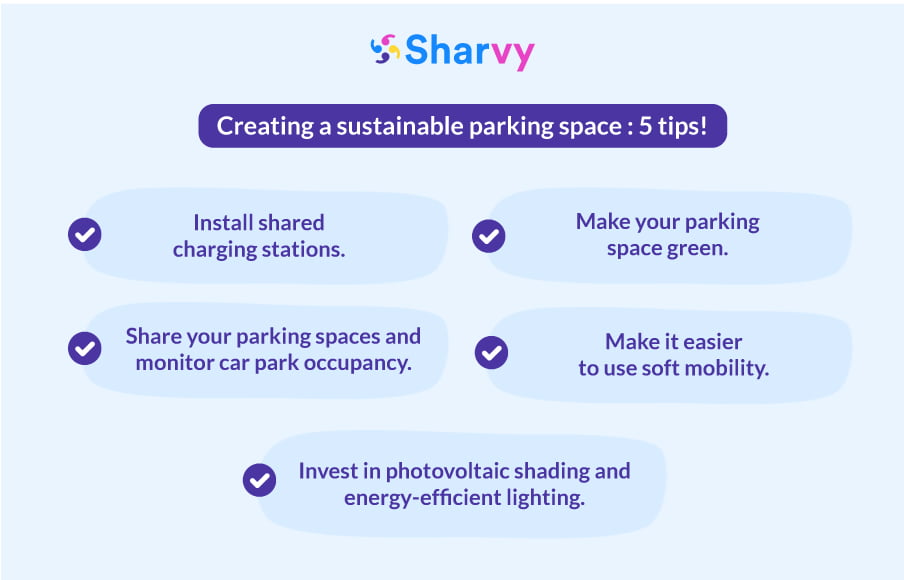
1. Install shared charging stations.
There’s no doubt that installing several charging points for electric and plug-in hybrid vehicles in company car parks is a strategic step towards a more sustainable future.
However, while many companies opt for this initiative, it is now an obligation governed by the United Kingdom. All new non-residential buildings with more than ten parking spaces must have a minimum of one chargepoint and cable routes for one in five (20%) of the total number of spaces. A parking space equipped with an IRVE must be accessible to people with reduced mobility.
This obligation encourages the transition to 100% electric vehicles to reduce dependence on fossil fuels, significantly reducing CO2 emissions and improving air quality.
✔ What are the benefits ?
By installing charging points in your company car park, you gradually establish yourself as a key player in the United Kingdom’s electric mobility transition, becoming a fully-fledged recharging point where your employees, customers, and visitors can recharge their vehicles throughout the day.
At the same time, you are meeting the needs of your employees, 60% of whom expect access to a recharging point in the company car park. This is because the constraints associated with battery autonomy may still hold many motorists back from going 100% electric.
So, by installing charging points in your car park, you’re meeting a strategic objective during a recruitment wave and improving the employee experience and the Quality of Life and Working Conditions (QLWC) within your company.
2. Make your parking space green.
As we are regularly reminded in the news, urbanization is, unfortunately, leading to soil sealing, devastatingly affecting the environment and our health. As a result, increasing the amount of green space is essential to improve water infiltration into the soil.
Firstly, choose grass for the floor of your car park. This encourages the natural infiltration of rainwater, unlike impervious surfaces such as tarmac.
Concrete car parks and roadways also upset the balance of biodiversity. So consider planting shrubs and other plants. In this way, you can encourage biodiversity (threatened by the artificialization of the ground) by creating a natural habitat for insects and birds. Not to mention improving air quality and creating a pleasant environment for your employees.
Finally, consider installing green roofs if your car park is covered. This way, you can contribute to thermal insulation, reduce energy consumption, and improve rainwater management.
✔ What are the benefits ?
As you will have realized, impermeable soils dry out, impoverish the soil, and cause untimely run-off.
By planting your car park, you significantly preserve the soil by making it porous. Not only do you allow water to infiltrate the ground, but you also allow water to evaporate naturally in an urban environment (if your car park is located in the city center) and prevent rainwater run-off from the area around your car park and limit the risk of flooding.
At the same time, there are benefits for your employees: by planting your car park, you improve their quality of life by embellishing a usually under-valued space. Last but not least, you’ll be reducing urban heat islets. Plant coverings help create extraordinary islets (reducing the ambient temperature in city centers to create a cooler, more pleasant environment).
3. Invest in photovoltaic shading & energy-efficient lighting.
In the UK, the vision of solar panel-equipped car parks is already a reality. Across the country, many car parks are getting an eco-friendly upgrade to harness the sun’s energy right above our cars and vans.
While there is no requirement in the UK, solar car parks have been around for years and there are signs that they are beginning to boom here. With electricity prices currently still elevated, many businesses are turning to on-site renewables to try to keep costs down in the long run.
There is a huge opportunity to turn more British car parks into solar farms, according to a new report published by the countryside charity CPRE and the UCL Energy Institute. “We think the total potential in the built environment is about 117GW,” says Prof Mark Barrett of UCL. “And of that, 11GW, we think, is car parks“.
✔ What are the benefits ?
Photovoltaic shading systems offer several advantages for car park managers, owners, and car park users.
Firstly, they enhance the value of the company car park. A space that is often left fallow and expensive. Moreover, if installed over large areas, the shaded regions produce significant amounts of solar energy at a lower cost. Businesses can reduce their energy bills and benefit from the electricity supplied to meet part of the car park’s needs (lighting, surveillance system, electric recharging point, etc). The part produced but not consumed can then be sold and fed into the public grid. This way, the company encourages a greener energy mix while combating potential energy shortages.
Photovoltaic shading systems also improve the comfort of your employees and visitors. They protect their vehicles from bad weather (rain and hail) and scorching weather. Without a doubt, it’s a guarantee of comfort for motorists.
Finally, by investing in photovoltaic shading, your company is committing to the energy transition by becoming a solar electricity production site with renewable, local energy and low CO2 emissions.
4. Share your parking spaces & monitor car park occupancy.
At first sight, it may seem surprising that pooling your parking spaces can help make your car park more environmentally friendly… But here are some valuable explanations on the subject.
On the one hand, please note that every week, the search for a parking space generates 30% of urban traffic. This has negative externalities : increased road congestion, more noise, air pollution (20% of CO2 emissions are released during this period), and other longer-term effects on the development of hypercentre neighborhoods.
But here’s the thing: of these 30%, only 2% concern residents. So 98% of negative externalities come from motorists who must park for a short or medium period (company employees, for example).
This is where sharing parking spaces comes in handy. Thanks to modern technologies such as the Sharvy application, it is now possible to pool your parking spaces.
In a few words, it allows you to share your parking spaces with different users. Ultimately, you optimize the use of your car park and define the parking management strategies that seem most effective to you.
For example, your company’s employees can have priority access to your car park from Monday to Friday. The Sharvy application and its equitable algorithm enable employees to share parking spaces fairly.
However, a company car park will tend to be empty at night and on weekends. At times when private individuals could use them. This is where sharing parking spaces can be a great way to make your car park more environmentally friendly.
✔ What are the benefits ?
By pooling your parking spaces, you can limit the number of vacant spaces and optimize what already exists so that you don’t have to build new car parks (which are expensive and harmful to the environment).
This approach helps to make your company car parks more environmentally friendly by reducing the demand for new buildings. This helps to limit the artificialization of land and, therefore, preserve a lot of green space.
At the same time, new parking management applications such as Sharvy offer real-time monitoring of your car park’s use and occupancy rate. As a result, and with the help of a real dashboard, your car park manager can identify unoccupied areas and turn them into green spaces (and benefit from the many advantages mentioned above). They can also decide to reduce energy consumption for lighting and ventilation in low-traffic areas.
By choosing these new ways of managing your company car park (smart parking), you’re inevitably making your own sustainable car park!
5. Simplify the use of soft mobility.
As you will have gathered, the urgent need to protect the environment and the climate calls for a radical transformation of car parks.
That’s why a company’s car park should no longer be just for motorists. It is, therefore, in the interests of companies to move away from the traditional “Parking Policy” towards a “Mobility Policy” serving all employees (motorists, cyclists, etc). The aim is to enable many users to make the most of this space.
So there are plenty of ideas for achieving this objective. You could, for example, choose to install a fleet of self-service bicycles and scooters, parking spaces reserved for car-sharing, electric car-sharing, and, of course, electric recharging points, as mentioned above.
✔ What are the benefits ?
By simplifying soft mobility and transforming your company car park into a real mobility hub, you are contributing to a net reduction in their carbon footprint. As a result, this transition significantly decreases greenhouse gas emissions, actively contributing to the fight against climate change and preserving our planet.
For example, if you have installed a bike rack in your car park beforehand, your employees will no longer have to worry about their bikes during the day, as they will be in a safe place, away from prying eyes and evil people. The same applies if you install charging points in your car park. Your employees will be much more inclined to use/buy an electric car.
These packages of complementary services seem trivial, but they can help people adopt sustainable mobility daily!
In conclusion
There’s no doubt about it : ecological car parks are paving the way for more environmentally-friendly urban mobility. And they are not limited to large buildings designed by architectural firms, as many people might think! This solution has the merit of being adaptable to all environments. Thanks to innovative surfacing, virtuous practices, and intelligent technologies, they are helping to build greener, more sustainable cities.
As an employer, there are many ways in which you can organize and improve the mobility of your employees. However, it would help to approach this challenge as you see fit, according to your business model, constraints, and budget.
Have a question? Check out the FAQ!
To sum up, what are the advantages of a sustainable parking?
There are many advantages to ecological car parks. For companies and employees alike. Here is a (non-exhaustive) list of the benefits of a sustainable parking :
- Support for sustainable urban development.
- Reducing carbon dioxide emissions and preserving biodiversity.
- Better stormwater management (reducing the risk of flooding).
- A more pleasant environment for motorists (shrubs, plants, and green spaces).
- A reduction in urban heat islands (a cooler, more enjoyable atmosphere).
- Reduced operating costs (energy-efficient lighting and renewable energy).
- A more attractive car park for a potential recruitment wave.
What does the future hold for sustainable parking?
Given the many advantages of eco-friendly parking, its future looks promising, with significant developments in three areas : sustainable mobility equipment and infrastructure (IRVE charging points, for example), British legislation, and advanced technologies!
Want to learn more? Check out our latest articles!
10 inequalities observed in company car parks!
What inequalities can be observed in company car parks? What impact do they have? What can be done about them? Find the answers here!
Need more parking spaces at work? 6 solutions to consider!
Are you short of parking spaces at work? Do you need internal and external solutions? How do you go about it? Here are our ideas!
How can access to company car park and the allocation of spaces be made fair?
What are the challenges related to company car park access? How can the allocation of spaces be made fair? Answers here!
Subscribe to our newsletter!
PARKING & WORKPLACE MANAGEMENT SOLUTION
Car park management - Charging points monitoring - Desk booking - Booking by time slots
SUBSCRIBE TO THE NEWSLETTER
Receive the latest Parking & Workplace trends by email once a month.

